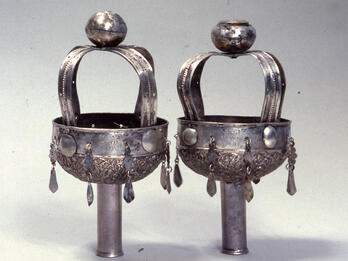Travelogue
After having arranged for fresh provisions and all kinds of refreshments, we set sail again, sailing away from land. Due to the wind’s silence, we proceeded into the sea without sailing, drifting for around two days and two nights.
Near midnight on the second day of the journey [ . . . ] we felt a half northwest wind. We sailed toward the southwest, and early in the morning discerned an island of great height, which our sailor called Monte Christ. This island, or better put a tall mountain, was around one mile in circumference, without human dwellings. We sailed past it. Toward night the wind became somewhat stronger and, fearing a storm and bad weather, the captain ordered that the anchor be cast. We floated in this way for one night, but toward midday the weather once again calmed and there was such good weather that the next afternoon and night, with good fortune, we sailed past another two unknown islands on our route. These were all very tall, wild, stone rocks. Here, on the following night, again we encountered such a storm wind that we thought we would be overturned. And there was land in sight, but it seemed that this land is more than 150 miles from us. However, we quickly discovered that this was not the case. We had all gone below deck to escape the waves that rocked our ship mightily, leaving only the pilot and helmsman above. They turned around, concentrating on other matters, and neither knew nor saw that while we were in the midst of a full storm we were not far from cliffs. However, as God desired to grant us grace, the captain by chance went up and saw a great darkness of cliffs [ . . . ]. So he jumped fiercely to the helm, grabbed it himself, yelling and turning it so quickly [ . . . ] that the ship, with the help of the one in heaven, changed its course and we did not touch the cliffs. Our ship was only one hair’s breadth from being smashed like glass. [ . . . ] Here we thank and praise the gracious God for saving us from this misfortune. As we approached this land, we discovered that it was Porto Ercole [in the province of Grosseto, Tuscany]. We discerned between these cliffs many caves that went very deep. I found these very frightening, because these caves could be the hiding places of Turkish pirates, who are often encountered in such caves and in this area, and who commit evil deeds and have captured many ships. Directly on the following day it happened. As we circled twenty sea miles away from the city Piombino [in the province of Livorno, Tuscany], there was a storm. Then our sailors saw in their sights a little ship coming straight at us [ . . . . ] As our sailor notified us of them and the Captain asked the constable to burn a piece of [ . . . ] in a certain manner, it indeed happened.1 However, no answer was received, indicating that this was not a friendly vessel but must be an enemy. And because our ship was equipped with eighteen pieces and because our people were too tired and exhausted from the previously mentioned storm, they were not capable of fighting these Turks if it was not absolutely necessary. And there was enough time to take flight, so we set our course for the island and city of Porto Longone [in the province of Livorno, Tuscany].
This island belongs to the Spanish and this place is forbidden for Jews; no Jew is allowed to set foot there. However, because we thought that we would not be identified, I disembarked and went onto land and into the city of Longone to get some refreshments and buy some provisions. It happened that on the ship with us there was an “Armianer” [meaning unclear] priest who was very angry at me because I often made fun of him on the ship, because he did not know one word of Italian. He understood from our behavior on the ship that we were Jews. Now, he had me on land and he thought that he would exact his revenge. So he approached the officer in charge of the soldiers, telling him that I was a Jew. I understood this by the many looks and glances I received from the people of this city. Something would almost certainly have happened to me, were it not for God’s supervision and my cautiousness. [ . . . ] This priest did his best and thought that he would capture me. However, with God’s help, I returned to the ship without hindrance. And the soldiers could not arrest me in a mischievous manner because they must inform the Inquisition of such matters. As soon as I arrived at the ship, I confided in a sailor. He immediately told me that I did not need to suffer, because no devil nor any [member of] the Inquisition could come aboard his ship, much less harass any person on board. And the sailor left the priest on land and did not let him return to the ship. This was his payment for frightening me and for his betrayal. [ . . . ]
Here we also came to a safe haven, which was the strong fortress and small town of Porto Ferrara [in the province of Ferrara, in the Emilia-Romagna region of Italy]. Here we disembarked. For fifteen days we had not set foot in any Jewish synagogue and here we found a few Jewish residents who treated us nicely and pleasantly. They said that we must be God’s angels, because they were not used to seeing foreign Jews here. To demonstrate this belief, they showed us an old, white [haired] man, who was born in Tunisia. He too had once arrived here on the island due to a storm, with a ship from the land of the Berbers, [ . . . ] and since then this person has remained here, more than forty years. [ . . . ] We had to stay there for two days, and on the third day we departed and sailed off swiftly. And six hours later we saw the coast of Leghorn, which in Italian is called Livorno [province of Tuscany, Italy].
Notes
[Probably some kind of signal.—Trans.]
Credits
Published in: The Posen Library of Jewish Culture and Civilization, vol. 5.




